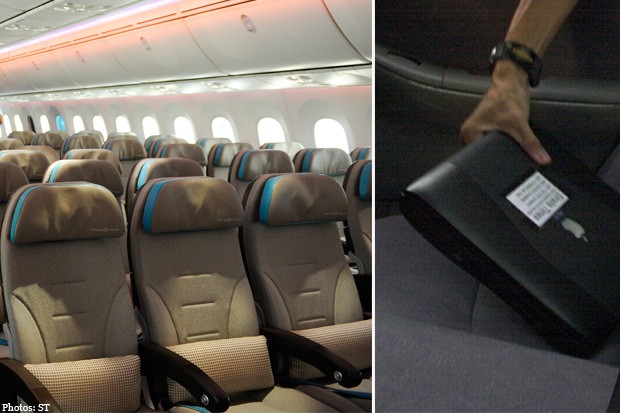Preventing thefts in the air

The next time you hop on a plane for a quick getaway, stay alert: Short-haul flights appear to be the favoured hunting ground of plane thieves.
There has been a spike in thefts on board planes this year - 37 cases were reported within the first seven months of this year, compared with 43 cases for the whole of last year and just one in 2011.
The thefts were all committed on regional short-haul flights to Singapore and in economy class cabins, say the police.
Over the last year, instances of cabin theft have taken place on flights coming from airports in 13 cities. Of these, seven were Chinese cities: Fuzhou, Guangzhou, Hong Kong, Macau, Shanghai, Shenzhen and Xiamen. The others were Bangkok, Ho Chi Minh City, Kota Kinabalu, Kuala Lumpur, Phnom Penh and Surabaya.
Thirty people have been arrested so far this year, while 36 were caught last year. Most of those arrested were from China.
Local and regional carriers tell SundayLife! they take precautions to prevent in-flight thefts and train their cabin crews to be vigilant.
SilkAir, Singapore Airlines, Tigerair and Jetstar say they make announcements before or after take-off to remind passengers to keep a close watch over their belongings. Scoot Airlines declined to comment.
A spokesman for Tigerair adds that the budget airline has "banned known criminals and suspects from our flights and established procedures for summoning the police to handle suspects on arrival".
SilkAir says its cabin crew is "trained to respond to various situations, which includes safety, security or any other issues that may arise during the course of the flight".
"In the event that any suspected theft is reported, SilkAir will inform the relevant authorities for security personnel to be on standby upon arrival at the aircraft's destination," says a spokesman.
Travel agencies and frequent travellers say constant vigilance is key to avoid falling prey to plane thefts. Still, there are other precautions travellers can take.
Mr Sam How, general manager of Asia-Euro Holidays, says travellers should put their cabin bags only in the overhead compartment directly above their seats. If that is not available, look for overhead spaces just in front of you.
"That way, you can see if someone opens the compartment where your bag is stowed," he says. "Try not to place your bag in areas behind your seat or out of your line of vision. If you have no choice, then make sure there are no valuables in your bag."
Hotelier and restaurateur Loh Lik Peng, 41, agrees. He says he always stows his cabin luggage in the overheard compartment directly above him and keeps his wallet and passport pouch in the seat pocket in front of him. "If you have valuables, such as jewellery, then you should definitely lock your cabin luggage," he adds.
Similarly, business consultant Aaron Chew, 27, always chooses the aisle seat and places his luggage right above him so he can see if anyone reaches into the compartment.
"I check on my belongings after bathroom breaks and before I land," he says.
Ms Alicia Seah, senior vice-president of CTC Travel, further advises passengers to put all their important documents in a pouch or a sling bag that they can strap on their bodies throughout the flight, even while sleeping.
Ms Elim Chew, founder of fashion label 77th Street, does just that, and takes the added precaution of locking her waist pouch if she is going to sleep on the flight.
The 46-year-old adds: "If you put valuables in check-in luggage, your luggage must be hardy and have good locks so that it can't be slashed open or broken into. Also, use multiple locks so as to make it difficult for thieves to open them."
A spokesman for Air France KLM recommends monitoring other passengers when disembarking from the plane to make sure they do not take your bags, especially if these were not stowed near you.
Ms Violet Lim, founder of dating agency Lunch Actually, says she always carries a bag that fits under the seat in front of her so she does not have to put it in the overhead compartment.
The 33-year-old also carries a small bag or zipped folder in which she keeps her passport, cash, credit cards, cellphone and other valuables.
"I either place this in the seat compartment in front of me or carry it with me at all times," she says.
Ms Cheryl Liew, 45, chief executive of human resources consultancy LifeWorkz, says she places her handbag containing valuables into a larger tote bag that contains less important things, such as make-up and a sweater. This makes it harder for someone to just reach into the bag and grab her valuables, she says.
"If I head to the washroom, I would just grab the small bag with all my valuables in it," she adds.
Some travellers have quirkier methods of insuring themselves against plane thefts.
Ms Pat Law, founder of social media consultancy firm Goodstuph, says she hums the acronym "WPP", which stands for "wallet, passport, phone".
"Like an annoying song I can't get out of my mind, I hum WPP to myself and check my belongings every other hour," says Ms Law, who is in her 30s.
She also splits her cash and credit cards up into different compartments of her bag and keeps her cellphone in the pocket of her jeans. "I'm an incredibly sound sleeper so I'm mindful of my belongings," she says.
"My phone is always tucked in my skinny jeans. By the time someone manages to pull out my phone, I figure I'd be wide awake and ready to throw a punch."
jennanid@sph.com.sg

Get a copy of The Straits Times or go to straitstimes.com for more stories.